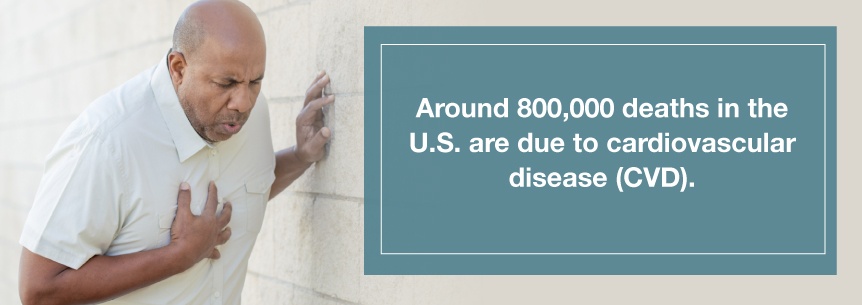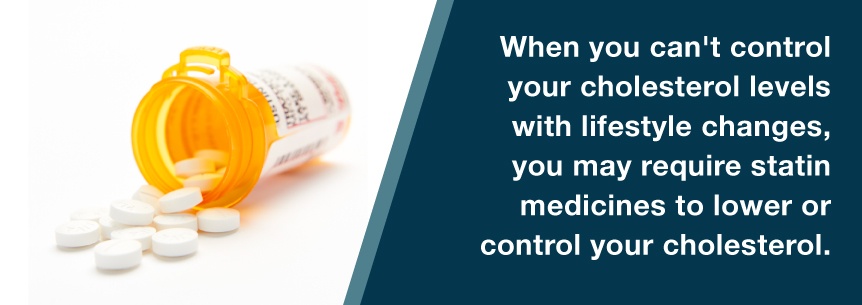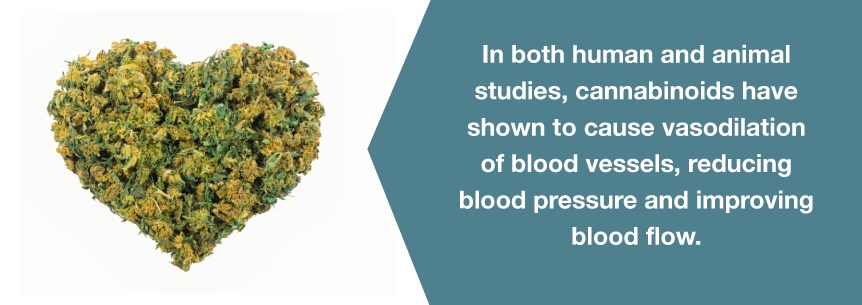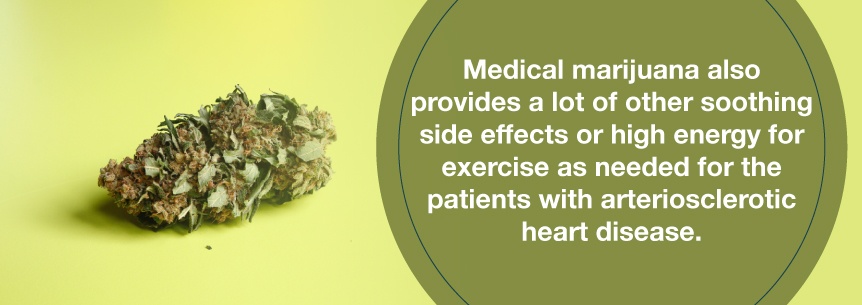While cannabinoids as medicinal compounds have a long timeline of historical use, their pharmacology, chemistry and clinical effects are only recently beginning to be studied in-depth. And, recognition of their therapeutic benefits in numerous medical ailments is increasing. Among the conditions researchers now study is medical marijuana for arteriosclerotic heart disease.
Arteriosclerosis is a condition where the blood vessels carrying nutrients and oxygen from your heart to the other areas of your body become stiff and thick. In some cases, they even restrict blood flow to your tissues and organs. Healthy arteries are elastic and flexible. However, as time passes, your artery walls may harden. This condition is known as hardening of the arteries.
Atherosclerosis is a certain form of arteriosclerosis, and people often use the terms interchangeably. Atherosclerosis is the buildup of cholesterol, fats and other substances on and in the walls of your arteries (plaque) restricting the flow of blood.
This plaque may then burst and cause a blood clot. While physicians may refer to atherosclerosis as a heart-related issue, it may also affect the arteries throughout your body. It’s a treatable and preventable condition.
Arteriosclerotic heart disease has several risk factors, which generally include:
Several factors may increase your risk of arteriosclerotic heart disease, including:
Atherosclerosis may occur in any artery of your body, including your legs, heart and kidneys. It can cause the following conditions:
The awareness of cardiovascular disease has a long history with some reported discoveries of its existence, including the below findings:
Many arteriosclerotic heart disease symptoms don’t appear until you have a blockage. Some of the common symptoms are:
Since atherosclerosis can cause a heart attack and a stroke, you should know the symptoms for these as well because they are a medical emergency. Heart attack symptoms include:
Stroke symptoms include:
If you experience any symptoms of either a stroke or heart attack, call 911 for emergency medical care.
Atherosclerosis complications include:
Aneurysms are another potential — and highly serious — complication of arteriosclerotic heart disease. An aneurysm is a bulge in your artery wall. Many individuals don’t experience any symptoms with aneurysms. Throbbing and pain in the area you have one could occur. An aneurysm is a medical emergency. If it bursts, it’s life-threatening.
Stress, depression and anxiety disorders could affect heart health. In those who don’t have heart disease, depression potentially links with heart failure and atherosclerosis development. Those who have heart disease, depression can cause poor outcomes.
Statistics about arteriosclerotic heart disease according to the American College of Cardiology (ACC) include:

Arteriosclerotic heart disease treatment can include:
When you receive treatment, you can often expect to experience gradual improvement in your health. How successful your treatment is depends on how severe your condition is, how quickly your doctor treats you and if you have any affected organs.
If you suspect you have arteriosclerotic heart disease, consult with your doctor. You’ll also want to keep an eye out for early signs of inadequate blood flow like leg pain, chest pain or numbness. By receiving a diagnosis early and beginning treatment, there’s a better chance of stopping atherosclerosis from getting worse and preventing a stroke, heart attack or another type of medical emergency.
Doctors can’t reverse hardening of the arteries, but they can treat the underlying cause. You can also prevent your condition from getting worse or slow down the process with dietary and healthy lifestyle changes.
If you have atherosclerosis, your doctor may give you advice on some heart-healthy lifestyle changes you should make, including:
Typically, there are no negative side effects to implementing heart-healthy lifestyle changes recommended by your physician.
Besides providing you with recommendations to change your lifestyle habits, your physician will likely prescribe you certain medications to avoid complications and control your arteriosclerotic heart disease.

When you can’t control your cholesterol levels with lifestyle changes, you may require statin medicines to lower or control your cholesterol. When you decrease your blood cholesterol level, you’re reducing your chances of having a stroke or heart attack. Doctors generally prescribe statin medication for individuals who have:
Your doctor may have you start statin medication if you have an increased risk of having a stroke or developing heart disease.
Side effects of statin medications may include:
You may receive a prescription for other medicines too, such as:
Medications to reduce your glucose can cause your blood sugar to go too low, resulting in you being confused or going into diabetic shock. Blood-pressure reducing drugs can make you feel lightheaded and dizzy, which could lead to you falling, having a car accident or other injuries. Other medications have their own set of side effects which you should discuss with your doctor.
You must take all your medications as your doctor prescribes them. Don’t skip a dose or change the amount of your medication without the guidance of your doctor. Even if you’re taking drugs as a treatment for your atherosclerosis, you should continue living a heart-healthy lifestyle.
Your doctor might suggest surgery or a medical procedure if your arteriosclerotic heart disease is severe. Some include:
All surgeries come with a risk of infection and complications, such as blood clots. If your surgeon uses anesthesia, you could experience an adverse reaction.
In the last 10 years, there have been significant CAD treatment advancements. Currently, treatment is medical, surgical or both depending on the severity, extent and clinical presentation of your CAD. The association between various science disciplines — like tissue engineering and biotechnology has resulted in the development of innovative therapeutic methods like:
These treatment approaches show promise in managing CAD and other related conditions.
Stem cell research is another area of development for arteriosclerotic heart disease, which focuses on the study of potential cardiac regeneration. Percutaneous coronary interventions include coatings and stent modifications, while nanotechnology studies study nano-drug delivery.
Studies show marijuana may offer neuroprotection and cardioprotection and limit cell damage after ischemic events with involves restriction of tissue blood flow, such as strokes and heart attacks. A study showed minimal doses of THC given two hours, 48 hours or three weeks continuously before a heart attack decreased infarct (a localized section of dead tissue caused by failed blood supply) size, thereby limiting heart damage.

In both human and animal studies, cannabinoids have shown to cause vasodilation of blood vessels, reducing blood pressure and improving blood flow.
The problems presenting themselves with these medicinal regimens are troubling at best. A baby aspirin a day may think the blood so it can’t deposit fatty plaque in the arteries in and around the heart. However, it also means bleeding out from an internal injury or an external wound and constant bruising are the risks one takes. Then there are the ulcerative side effects too; stomach, throat and esophageal ulcers can form, and then the patient has to take another medicine to alleviate the symptoms of that. The cholesterol reducing and cholesterol blocking pills, while effective, require regular blood draws to make sure they aren’t having any negative effects on the liver, which produces the body’s natural cholesterol. A patient who is also a hemophiliac or deathly afraid of needles would have big issues with either of these regimens.
On the other hand, medical marijuana has two specific natural compounds in it proven in clinical trials to reduce plaque buildup in the arteries of mice. Prof. Roger Pertwee conducted this study, and it is currently under further research by GW Pharmaceuticals, with regards to the health benefits of THC, a non-psychoactive component of medical marijuana and its well-known cousin, THC. Without all the hyper science jargon, their studies combined point to a cure for liver diseases, obesity, and metabolic disorders, all of which arteriosclerotic heart disease is a direct result.
Medical marijuana also provides a lot of other soothing side effects or high energy for exercise as needed for the patients with arteriosclerotic heart disease. You can’t overdose on it. It doesn’t require blood fat monitoring (unless your a participant in one of the drug trials or case studies) through needles. It also won’t thin the blood to the point it can’t properly coagulate when the body becomes severely injured.

It’s a safer option, and quite possibly the safest option out there. Further research needs to continue before physicians regularly prescribe medical marijuana for arteriosclerotic heart disease. But right now, some pot docs are already writing prescriptions for it, in the hopes to get ahead of the curve with the pharmaceutical companies.
If you are a patient with arteriosclerotic heart disease and a firm believer in the world of natural medicine or you just want to explore a less dangerous option for your health, medical marijuana may be right you. You have to check the laws of your state for medical marijuana’s legality and acquire a medical marijuana carrier’s card before you consult with a marijuana prescribing doctor about whether pot is right for you and your heart and arteries. Who knows? It might just be the best thing to ever happen to your health.
Cannabinoids are essential for acting as an anti-inflammatory and regulating the immune system. Since inflammation plays a role in atherosclerosis, using cannabinoids could slow the progression of atherosclerosis down.
Symptoms medical marijuana and arteriosclerotic heart disease treatment can help with include:
Some cannabis and arteriosclerotic heart disease strains to consider include:
High blood pressure is a significant risk factor for heart attack, stroke, kidney disease and heart failure. Medical cannabis for arteriosclerotic heart disease strains potentially beneficial for lowering blood pressure include:
Gaining physical and mental benefits of marijuana for arteriosclerotic heart disease also depends on how you consume it. Each delivery method provides you with its host of effects and unique experience.
While smoking is the quickest way to experience medical weed’s effects, it could contain some of the same irritants, carcinogens and toxins cigarette smoke contains. And, these all contribute to heart disease.
Therefore, some other healthier choices of administration include:
You may be a good match for one or more of the above methods of taking your medical marijuana for arteriosclerotic heart disease. Your trial and error is part of the process of finding the best method of consumption, as well as working with your cannabis budtender to help you find what works well for you.
If you have been diagnosed with arteriosclerotic heart disease or just suffered a heart attack, and are looking for a more natural alternative of treatment, marijuana and arteriosclerotic heart disease treatment might fit the bill. To obtain medical cannabis, you need to check your state laws and receive your recommendation from a qualified cannabis doctor.
To take the confusion out of starting cannabis for arteriosclerotic heart disease for your heart condition, MarijuanaDoctors.com has a comprehensive database of cannabis doctors and dispensaries you can turn to. Here you can find and book your appointment with a cannabis doctor and get the process of symptom relief started.
Find A Doctor Find A Dispensary